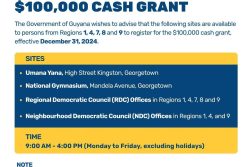Dear Editor,
Guyana is rapidly positioning itself as a critical player in global agriculture, thanks to the transformative investments championed by President Irfaan Ali and his administration. The government in doing so has recognized the nation’s vast agricultural potential, these initiatives are geared towards addressing food security challenges, bolstering regional trade, and modernizing the agricultural sector to meet global standards as we are seeing today.
One of Guyana’s primary assets is its fertile land, particularly the expansive plains of the coastal region, which are ideal for producing rice, sugar, and a variety of other crops. The government has made significant strides in improving the productivity of this arable land. For instance, efforts are being made to rehabilitate neglected infrastructure such as drainage and irrigation systems, as we know, billions have already been invested and is crucial for mitigating the risks posed by climate change.
President Ali’s administration has also placed significant emphasis on diversification, moving beyond traditional staples like rice and sugar to explore high-value crops and aquaculture. Through partnerships with international organizations and regional allies like CARICOM, the government aims to reduce the region’s annual food import bill by 25% by 2025, a huge step for the agricultural sector. This initiative aligns with the broader goal of making Guyana a regional breadbasket.
Moreover, the government is prioritizing the integration of technology into farming practices. Investments in precision agriculture, data-driven farming techniques, and research institutions are aimed at boosting yield efficiency while minimizing environmental impact. A notable example is the collaboration with India to introduce innovative rice varieties that are more resilient to adverse weather conditions and with the recent visit by Prime Minister Modi, we can only expect further collaboration between the two countries, this is forward thinking by the government.
President Ali and along with the Agriculture Minister Zulfikar Mustapha has also been vocal about the importance of agro-processing, a sector critical for adding value to raw products and creating jobs. New processing facilities for products like cassava, fruits, and spices are being developed, opening avenues for exports and fostering economic growth.
With oil revenues providing the financial backing, these ambitious agricultural projects are well-funded and sustainable. This foresight ensures that Guyana not only secures its own food security but also become a key supplier in a world grappling with increasing demand for agricultural products. By leveraging its natural resources and strategic investments, Guyana under President Irfaan Ali is poised to redefine its agricultural legacy, making it an indispensable player in the global food supply chain.
Sincerely,
Andrew Harrinarine





